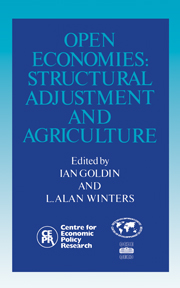Book contents
- Frontmatter
- Contents
- List of figures
- List of tables
- Preface
- Acknowledgements
- List of conference participants
- 1 Introduction: from macro to maize
- Part One Open economy analysis
- Part Two The small country assumption and trade reform
- Part Three Risk and adjustment
- Part Four Government's role
- 11 Infrastructure, relative prices and agricultural adjustment
- Discussion
- 12 Structural factors and tax revenue in developing countries: a decade of evidence
- Discussion
- 13 International dimensions of the political economy of distortionary price and trade policies
- Discussion
- Index
Discussion
from Part Four - Government's role
Published online by Cambridge University Press: 04 August 2010
- Frontmatter
- Contents
- List of figures
- List of tables
- Preface
- Acknowledgements
- List of conference participants
- 1 Introduction: from macro to maize
- Part One Open economy analysis
- Part Two The small country assumption and trade reform
- Part Three Risk and adjustment
- Part Four Government's role
- 11 Infrastructure, relative prices and agricultural adjustment
- Discussion
- 12 Structural factors and tax revenue in developing countries: a decade of evidence
- Discussion
- 13 International dimensions of the political economy of distortionary price and trade policies
- Discussion
- Index
Summary
Kym Anderson's thesis is that international factors are becoming increasingly important in influencing domestic agricultural policies. In chapter 13, he focuses primarily on the reform of policies in richer countries. This is legitimate given the central role of these countries in world agricultural markets, and by implication the significance of their policies for developing country exporters or importers.
Anderson argues that it is necessary to make the transition from a closed to an open economy model of the political market for protection. Such a transition would parallel recent developments in some other areas of economic theory (e.g., macroeconomics). In this regard, I am in full agreement with him. It has long seemed to me that the political economy approach has been unnecessarily simplistic in focusing almost exclusively on the role of domestic interest groups in determining the supply and demand for protection. It is time for the concept of the open economy to find its place in this branch of the literature.
The political market model for government assistance is useful for characterising the broad difference between rich and poor countries in their approach to agricultural policy. The model posits that in poor countries both the demand for and supply of agricultural protection is weak, consequently effective protection is low relative to other sectors. The opposite conditions hold in richer countries.
Anderson identifies the principal cause of the position of the relevant curves in poorer countries as one of weak demand for agricultural assistance. In these countries, political power is often urban-centred; consequently, the supply of protection for agriculture is also relatively weak. This tends to result in discrimination, particularly against domestic food-crop or smallholder export agriculture.
- Type
- Chapter
- Information
- Open EconomiesStructural Adjustment and Agriculture, pp. 310 - 314Publisher: Cambridge University PressPrint publication year: 1992



